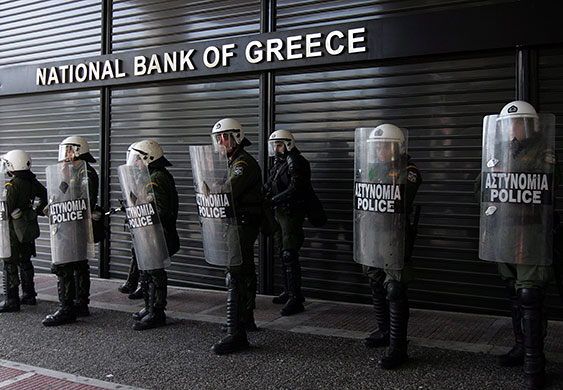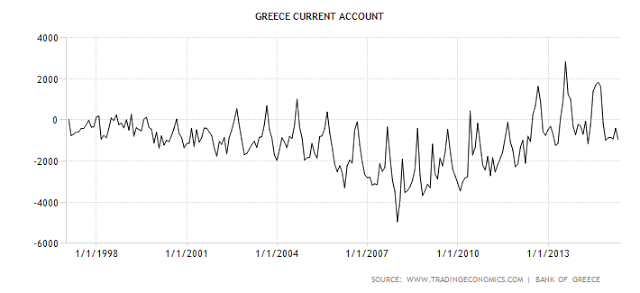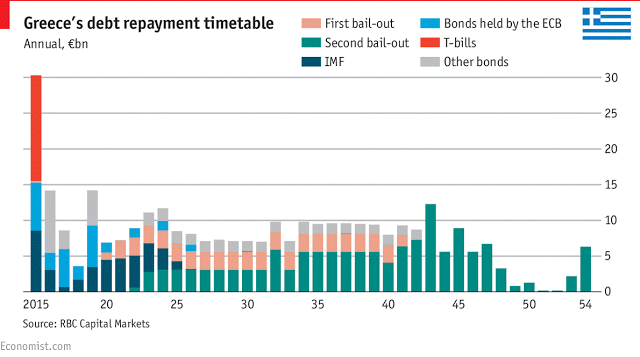Summary:
Greece's banks have been closed since 29th June. The closure followed the ECB's decision not to increase ELA funding after talks broke down between the Greek government and the Eurogroup.The closure is doing immense economic damage. The cash withdrawal limit of 60 euros per bank card per day is restricting spending in the Greek economy to a trickle. Media generally focus more on the hardship that the cash limit causes for households: but far worse is the inability of businesses to access working capital and make essential payments. Businesses are failing at a rate of knots. People are losing their jobs. And bank loan defaults are rising rapidly. The closure was, of course, the decision of the Greek government, as was the associated decision to impose partial capital controls. But it is hard to see that they had any choice. Deposits have been draining from Greek banks for months, but when talks broke down the outflows increased to a full-blown bank run. The ECB's decision not to increase liquidity was rather analogous to refusing a blood transfusion when a patient is haemorraghing. Without additional liquidity support, the banks would quickly have bled to death.
Topics:
Frances Coppola considers the following as important: banks, central bank, currency, Debt, default, Greece, Grexit
This could be interesting, too:
Greece's banks have been closed since 29th June. The closure followed the ECB's decision not to increase ELA funding after talks broke down between the Greek government and the Eurogroup.The closure is doing immense economic damage. The cash withdrawal limit of 60 euros per bank card per day is restricting spending in the Greek economy to a trickle. Media generally focus more on the hardship that the cash limit causes for households: but far worse is the inability of businesses to access working capital and make essential payments. Businesses are failing at a rate of knots. People are losing their jobs. And bank loan defaults are rising rapidly. The closure was, of course, the decision of the Greek government, as was the associated decision to impose partial capital controls. But it is hard to see that they had any choice. Deposits have been draining from Greek banks for months, but when talks broke down the outflows increased to a full-blown bank run. The ECB's decision not to increase liquidity was rather analogous to refusing a blood transfusion when a patient is haemorraghing. Without additional liquidity support, the banks would quickly have bled to death.
Topics:
Frances Coppola considers the following as important: banks, central bank, currency, Debt, default, Greece, Grexit
This could be interesting, too:
Merijn T. Knibbe writes ´Extra Unordinarily Persistent Large Otput Gaps´ (EU-PLOGs)
Merijn T. Knibbe writes In Greece, gross fixed investment still is at a pre-industrial level.
Robert Skidelsky writes Britain’s Illusory Fiscal Black Hole
Matias Vernengo writes Argentina on the verge
Greece's banks have been closed since 29th June. The closure followed the ECB's decision not to increase ELA funding after talks broke down between the Greek government and the Eurogroup.
The closure is doing immense economic damage. The cash withdrawal limit of 60 euros per bank card per day is restricting spending in the Greek economy to a trickle. Media generally focus more on the hardship that the cash limit causes for households: but far worse is the inability of businesses to access working capital and make essential payments. Businesses are failing at a rate of knots. People are losing their jobs. And bank loan defaults are rising rapidly.
The closure was, of course, the decision of the Greek government, as was the associated decision to impose partial capital controls. But it is hard to see that they had any choice. Deposits have been draining from Greek banks for months, but when talks broke down the outflows increased to a full-blown bank run. The ECB's decision not to increase liquidity was rather analogous to refusing a blood transfusion when a patient is haemorraghing. Without additional liquidity support, the banks would quickly have bled to death.
Ordinarily, in a bank run the correct action for the central bank is to increase liquidity to accommodate the desire of the private sector to convert bank deposits into physical cash and/or move their money somewhere safer. But this is when the reason for the bank run is concerns about bank solvency. In the Greek case, the bank run was due to concerns about sovereign solvency, and in particular about the growing possibility of redenomination of deposits into a new, devalued currency. Since the reason for the bank run was political, therefore, I find it hard to criticise the ECB. It was in a cleft stick. If it increased liquidity, it was arguably supporting the Greek government. If it reduced it, it was supporting the Eurozone creditors. It therefore did neither. Maintaining ELA at its existing level was a politically neutral decision.
The real mistake was made by the Greek government. It was always obvious that the talks would be difficult, and the Greek government's "strength in weakness" approach meant that it had to allow itself to be pushed dangerously close to Grexit. Bank runs were inevitable. So allowing Greek banks to become totally reliant on a central bank controlled by Greece's Eurozone creditors - and itself a creditor - was a fatal flaw in the Greek government's strategy. It should have imposed capital controls long before. Had it done so, monetary conditions in Greece would still have been very tight but the banks could have remained open.
But the failure to impose capital controls early on was symptomatic of a much larger error. The Greek government allowed itself to drift close to the Grexit cliff edge in the belief that the Eurozone creditors would not dare push it over. On Sunday night, its bluff was called - and it had no response. It had not prepared for the possibility that it might actually have to do the unthinkable and leave the Euro.
The lack of a "plan B" meant that the Greek government was left with no choice but to cave in to its creditors' demands. I have criticised the methods used to break the Greek PM Alexis Tsipras, but the end result was inevitable. He could not accept the "temporary Grexit" plan put forward by Germany's Wolfgang Schaueble. To do so would be catastrophic for the Greek economy. "We do not have the foreign reserves for a Grexit", he explained afterwards. He is right, and those who think that Schaueble's "sin-bin" would have been better for Greece are wrong.
Greece's situation should properly be regarded as a foreign exchange crisis. It is using a foreign currency as its domestic currency, and now that the foreign issuer of that currency has turned off the taps, its only sources of currency are earnings from trade and international borrowing. Greece is of course unable to borrow on the international markets, so earnings from trade are the only possible source of currency. But Greece has a trade deficit, and it imports essentials such as fuel and some foodstuffs. So even with the banks closed and capital controls, there is still a net drain of Euros from the Greek economy.
UPDATE: Kleingut (see comments) points out that it is the current account not the trade balance that matters. This is correct. And for the last two years the current account has been in credit during the tourist season:
It is not clear whether this is sufficient to make Euro earnings positive on an annualised basis. And the wide swings in Euro income need to be buffered by reserves to avoid cash flow problems. But more importantly, it is now a racing certainty that income from tourism will fall significantly in 2015. Bookings are down by 30% despite operators slashing prices. Even without Grexit, therefore, Greece will have a foreign exchange problem in the autumn if not before unless ELA is restored.
So the hope is that with agreement on a new bailout, the ECB will turn the ELA taps back on, easing monetary conditions and allowing discretionary cross-border trade to resume.
Schaueble's scheme would have ended this hope. Here is how it is described in the short paper leaked to the press on Saturday:
In case debt sustainability and a credible implementation perspective cannot be ensured up front, Greece should be offered swift negotiations on a time-out from the Eurozone, with possible debt restructuring, if necessary, in a Paris Club-like format over at least the next 5 years. Only this way forward could allow for sufficient debt restructuring, which would not be in line with the membership in a monetary union (Art. 125 TFEU).
The time-out should be accompanied by supporting Greece as an EU member and the Greek people with growth-enhancing, humanitarian and technical assistance over the next years.As always, the devil is in the detail. Greece cannot be prevented from using the Euro, either domestically or internationally. But since it cannot borrow internationally and its Euro earnings are net negative, its access to supplies of the Euro can be completely cut off. A "time-out" would presumably be implemented by removing ELA from the banks, forcing them to relinquish their Euro reserves, and possibly also by suspending its membership of the Target2 international Euro settlement system, although as Target2 includes among its members four non-Euro users, this would be politically problematic. But removing ELA would be sufficient to exclude Greece from Euro membership.
And it would have terrible consequences. As Silvia Merler explains, ELA is a significant part of the Greek banks' liabilities:
At the aggregate level, central bank liquidity accounted for about 30% of total liabilities the Greek banking system, as of May 2015. At the level of individual institutions, ECB lending was equivalent to 21% of assets in NBG, 37% in both Alpha and Piraeus and 39% in Eurobank.Removing ELA would be the equivalent of a simply enormous cash margin call - and as those familiar with the fall of the American insurance giant AIG will no doubt recall, large sudden cash margin calls can break financial institutions. Suddenly removing ELA from Greek banks would undoubtedly break them. Schaueble's "time-out" means the bankruptcy of the entire Greek banking sector.
It also means the denial of cash to Greek households and the loss of household and business deposits in the inevitable bank insolvencies. So it is not just the banks who would be suddenly insolvent. It would be the whole of Greek society.
The solution to this is of course for the Greek government to seize the Greek central bank (which is currently part of the Eurosystem) and force it to replace the lost ELA with a new Greek currency. Realistically this would be a Greek Euro, not drachma. The banks could then be recapitalised by the Greek state (i.e. nationalised) using money created by the now-captive central bank, rather than international borrowing. And since the new currency would be Euro not drachma, household and business deposits would not need to be redenominated. This sounds like a plan, doesn't it?
The domestic monetary squeeze could indeed be solved by creating Greek euros. But these would not be accepted internationally, since the ECB would regard them as counterfeit money. So Greece would still have to find "proper" euros, or perhaps US dollars or sterling, to pay for its imports - and although such a tight monetary squeeze would cause a sharp fall in imports, having to curtail essential imports because of lack of foreign exchange would do the sort of damage to the economy that cutting supply lines does in a war. Countries can be broken through lack of foreign exchange. Just ask India.
There is a further problem with Schaeuble's scheme. It envisages debt restructuring in a Paris Club-type arrangement. But all of Greece's debt is Euro-denominated. Grexit, even on a supposedly temporary basis, would leave Greece with no means whatsoever of obtaining the Euros to service that debt. Here, courtesy of RBC Capital Markets, is a graphic showing Greece's repayment schedule over the next few years:
The chart shows that if Greece were completely cut off from Euro supplies, default on its debts to the ECB, the IMF and the private sector would be certain, although the Eurozone might decide to swap out the ECB's holdings with the ESM - a ruse suggested originally by the Greek government's erstwhile finance minister Yanis Varoufakis. Interestingly, though, payments to other Eurozone official creditors would not be affected provided that Greece returned to Euro membership by 2020. Schaueble's choice of 5 years is not accidental. Temporary exit would force losses on to the IMF and the private sector ahead of Eurozone official creditors. Nice.
Defaulting on payment to the IMF prevents the IMF or its partner Bretton Woods organisation, the World Bank, offering further aid. All humanitarian relief would therefore have to come through bilateral assistance from friendly countries. And this is where the geopolitics gets nasty. Russia has already offered to maintain gas supplies, and I'm sure further "humanitarian assistance" would be offered if Greece were forced into a Grexit, whether permanent or temporary. That would go down REALLY well with the USA.
But what about this Paris Club lark? If I were the Club de Paris, I wouldn't touch this with a barge pole. Greece is already in IMF arrears. It is by Club de Paris standards a rich country, so would not qualify for exceptional assistance. And its official creditors have so far shown complete intransigence as far as debt relief is concerned - yes, even the IMF, which wants everyone except itself to restructure Greece's debt. Admittedly, Schaueble suggests that Eurozone creditors might be more willing to consider debt restructuring including NPV haircut if Greece were not in the Eurozone, but as Greece would still be an EU member it's really not clear why the Club de Paris should be involved. It would risk being drawn into the Eurozone's political quagmire for no purpose.
The fact is that Schaueble's "sin bin" would be the worst possible outcome for Greece. Even a permanent Grexit including leaving the EU would be preferable, since at least then it could default on Euro-denominated debts. But it would still face a foreign exchange crunch due to its import dependence. Grexit is toxic while Greece's export sector is so weak.
Alexis Tsipras and Euclid Tsakalotos made the best decision possible in a dreadful situation. They should be commended for that. But the drama is not over yet. This show begins and ends with banks - and Greek banks are now terribly damaged. The bailout includes proposals for restructuring them which will inflict further severe damage on the Greek economy and almost certainly lead to the failure of the new program. I shall discuss this in my next post.



